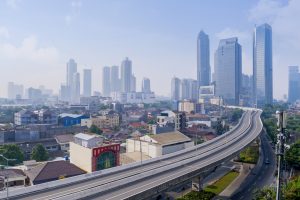After several weeks of spiking COVID-19 infections driven by the fast-spreading Omicron variant, Indonesia’s government yesterday reported its highest ever daily case load. The country identified 57,049 new infections, topping the previous record of 56,757 that was set on July 15, in the midst of a devastating Delta wave that ravaged the islands of Java and Bali
The record, which brings Indonesia’s total number of confirmed infections to more than 4.9 million, the highest in Southeast Asia, is a testament to the extreme virality and transmissibility of the Omicron variant. As recently as mid-December, Indonesia’s case numbers had fallen to below 200 per day, after months of heroic efforts to depress the wave of Delta infections.
Given the surge, the government has been unable to avoid reimposing some limited restrictions. Early last week, in the midst of continuing daily increases, Indonesia announced that it would tighten social curbs in Jakarta, Bandung, and Yogyakarta, as well as on the island of Bali, which fully opened to international tourist arrivals earlier this month. Under the new regulations, supermarkets, malls, and restaurants will operate at 60 percent capacity, and places of worship will be forced to halve their capacity, according to Reuters.
On the whole, however, the authorities have been taking the sudden spike in their stride, perhaps due to the relatively mild nature of the Omicron variant. While occupancy rates at COVID-19 referral hospitals in Jakarta is hovering around 60 percent, up from just 5 percent in early January, rates of hospitalization, serious illness, and death have been much lower than during last year’s surge.
Jakarta has not yet seen the chaotic scenes from last year, when, as the AP described it, “hospitals erected plastic tents as makeshift intensive care units and patients waited for days before they were able to be admitted.” The same is true of death rates, which reached a daily high of 2,069 at the peak of last year’s outbreak, compared to just 134 deaths yesterday.
On Monday, Health Minister Budi Gunadi Sadikin said that cases and deaths are projected to increase further, but that the health care system should hold firm. “I don’t think the peak of deaths in the current omicron outbreak will exceed 500,” Sadikin said.
For this reason, the Indonesian government could lift all quarantine requirements for international arrivals as early as April, with Luhut Pandjaitan, the jack-of-all-trades coordinating minister who is responsible for the COVID-19 response in Java and Bali telling Bloomberg, “We need to find that balance between the need to maintain health and the need to maintain the economy.”
In this regard, the Indonesian authorities can draw some additional hope from the situation in the Philippines, which last month exceeded the peaks from last year’s Delta outbreak, before seeing infections fall back just as sharply. All the same, Indonesia has still recorded more than 100 deaths per day since Friday. Given its relatively low levels of vaccination – just shy of half the population has received the standard two-dose vaccine regimen – the transition to economic normalcy will likely continue to exact a considerable human toll.

































